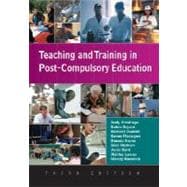
| Acknowledgements | p. vii |
| Abbreviations | p. viii |
| Introduction | p. 1 |
| Working in post-compulsory education | p. 4 |
| What is Chapter 1 about? | p. 4 |
| Contested concepts of professionalism in PCE | p. 5 |
| Three educational thinkers | p. 15 |
| The 'triumph' of vocationalism | p. 22 |
| The lifelong learning teacher: learning and developing | p. 33 |
| What is Chapter 2 about? | p. 33 |
| Teacher learning and development | p. 34 |
| Continuing professional development | p. 36 |
| Initiatives supporting CPD | p. 37 |
| Strategies for CPD | p. 41 |
| Student learning in post-compulsory education | p. 60 |
| What is Chapter 3 about? | p. 60 |
| Factors affecting student learning | p. 61 |
| Learning theories | p. 71 |
| Effective learning | p. 77 |
| Learner autonomy | p. 82 |
| Teaching and the management of learning | p. 88 |
| What is Chapter 4 about? | p. 88 |
| The planning process | p. 89 |
| Managing the learning environment | p. 98 |
| Resources for teaching and learning | p. 108 |
| What is Chapter 5 about? | p. 108 |
| What is a learning resource? | p. 109 |
| The effective use of learning resources | p. 111 |
| The organization of learning resources | p. 113 |
| Audio-visual learning resources | p. 114 |
| IT learning resources | p. 121 |
| The production of learning resources | p. 132 |
| Open and flexible learning | p. 133 |
| Assessment | p. 143 |
| What is Chapter 6 about? | p. 143 |
| Assessment: ourselves and our students | p. 144 |
| Referencing | p. 147 |
| Assessment techniques | p. 149 |
| Evidence-based assessment | p. 152 |
| Assessment for learning | p. 164 |
| Reviewing, recording and reporting achievement | p. 167 |
| Exploring the curriculum | p. 178 |
| What is Chapter 7 about? | p. 178 |
| What is the curriculum? | p. 178 |
| What are the key features of our courses? | p. 184 |
| What ideologies (values, assumptions and purposes) underpin our courses? | p. 190 |
| The 14-19 reforms | p. 195 |
| Where do you stand so far? | p. 206 |
| Course design, development and evaluation | p. 211 |
| What is Chapter 8 about? | p. 211 |
| Designing and developing your course | p. 211 |
| Evaluating your course | p. 224 |
| Scrutinizing your course | p. 230 |
| Developments in post-compulsory education | p. 242 |
| What is Chapter 9 about? | p. 242 |
| The purpose of the chronology | p. 244 |
| A chronology of post-compulsory education | p. 245 |
| A note on comparative chronologies | p. 269 |
| Bibliography | p. 274 |
| Index | p. 287 |
| Table of Contents provided by Ingram. All Rights Reserved. |
The New copy of this book will include any supplemental materials advertised. Please check the title of the book to determine if it should include any access cards, study guides, lab manuals, CDs, etc.
The Used, Rental and eBook copies of this book are not guaranteed to include any supplemental materials. Typically, only the book itself is included. This is true even if the title states it includes any access cards, study guides, lab manuals, CDs, etc.